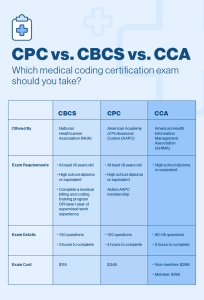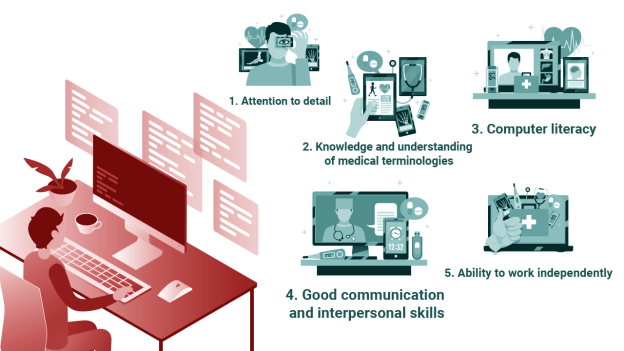to become a clinical coder, there are specific qualifications that you need to possess. Clinical coding is a critical aspect of healthcare management, as it involves translating patient medical records into standardized codes for billing and research purposes. A successful clinical coder must have a thorough understanding of medical terminology, anatomy, and disease processes. In addition, a solid foundation in coding systems, such as the International Classification of Diseases (ICD), is essential. Knowledge of coding guidelines and regulations is also crucial to ensure accurate and compliant coding. In this article, we will explore in detail the qualifications required to pursue a career as a clinical coder and how you can obtain them.
Education and Training Requirements

High School Diploma or GED
To become a clinical coder, a high school diploma or GED is typically the minimum education requirement. This foundational level of education ensures that individuals have a basic understanding of key subjects such as language, mathematics, and science.
Associate’s Degree
While a high school diploma is the minimum requirement, obtaining an associate’s degree can significantly enhance one’s prospects in the field of clinical coding. An associate’s degree in health information technology or a related field provides a more comprehensive education, covering topics such as medical coding, anatomy, medical terminology, and healthcare laws and regulations.
Certification Courses
To excel in the field of clinical coding, it is important to obtain additional certification courses to demonstrate specialized knowledge. These courses typically cover the nuances of medical coding, including coding systems such as ICD-10-CM and CPT. Completing these courses not only enhances your coding skills but also demonstrates your commitment to continuous learning and professional development.
Continuing Education
Continuing education is crucial in the field of clinical coding due to the evolving nature of healthcare regulations and coding systems. Staying up to date with the latest industry developments ensures that you maintain your competence and proficiency in the field. Many professional organizations and institutions offer continuing education programs specifically designed for clinical coders.
Knowledge and Skills

Medical Terminology
A strong understanding of medical terminology is essential for clinical coders. This knowledge helps coders accurately decipher medical reports, diagnoses, and procedures. Being well-versed in medical terminology enables coders to assign the appropriate codes and ensure that medical records are accurately coded for billing purposes.
Anatomy and Physiology
a solid foundation in anatomy and physiology is crucial for clinical coders. Understanding the structure and functions of the human body aids coders in accurately assigning codes based on specific medical procedures and diagnoses. This knowledge allows them to code with precision and avoid potential errors that could have detrimental effects on patient care and reimbursement.
ICD-10-CM and CPT Coding
Proficiency in ICD-10-CM (International Classification of Diseases, 10th Revision, Clinical Modification) and CPT (Current Procedural Terminology) coding is a fundamental skill for clinical coders. ICD-10-CM coding is used to classify and code diagnoses, while CPT coding is used for coding medical procedures and services. Mastering these coding systems ensures accurate and consistent coding, leading to proper reimbursement and compliance with healthcare regulations.
Healthcare Laws and Regulations
A comprehensive understanding of healthcare laws and regulations is imperative for clinical coders. These professionals must adhere to strict guidelines to ensure compliance with coding standards and ethical practices. Staying informed about changes and updates to healthcare laws and regulations allows coders to accurately code medical records and avoid potential legal and ethical issues.
Experience

Internship or Externship
Gaining hands-on experience through an internship or externship is highly beneficial for aspiring clinical coders. These opportunities provide practical training in real healthcare settings, allowing individuals to apply their knowledge and skills in a professional environment. Internships and externships also offer the chance to observe experienced coders at work, providing valuable insights and mentorship.
Work Experience in the Medical Field
Prior work experience in the medical field can greatly enhance your prospects as a clinical coder. Experience working in healthcare facilities, such as hospitals or clinics, provides valuable exposure to medical terminology, procedures, and documentation. It also demonstrates your commitment to the field and your ability to work in a healthcare setting.
Certification

Certified Coding Associate (CCA)
The Certified Coding Associate (CCA) certification is offered by the American Health Information Management Association (AHIMA). This certification validates foundational coding skills and knowledge, indicating proficiency in ICD-10-CM and CPT coding systems. Obtaining the CCA credential demonstrates your commitment to excellence in the field of clinical coding.
Certified Professional Coder (CPC)
The Certified Professional Coder (CPC) certification is awarded by the American Academy of Professional Coders (AAPC). This certification is highly regarded in the industry and signifies expertise in medical coding across various healthcare settings. The CPC certification requires a thorough understanding of ICD-10-CM, CPT, and HCPCS (Healthcare Common Procedure Coding System) coding.
Certified Coding Specialist (CCS)
The Certified Coding Specialist (CCS) certification is another valuable certification offered by the American Health Information Management Association (AHIMA). This certification focuses on inpatient coding and requires a high level of proficiency in coding and medical record analysis. The CCS certification is especially relevant for individuals seeking to specialize in coding for hospital inpatient services.
Personal Attributes

Attention to Detail
Attention to detail is crucial for clinical coders to accurately assign codes and ensure the integrity of medical records. Coders must meticulously review clinical documentation and identify key information to code accurately. Attention to detail mitigates the risk of coding errors and helps maintain the highest standards of coding accuracy.
Analytical Skills
Clinical coders must possess strong analytical skills to interpret medical information and apply the appropriate codes. Analytical skills enable coders to identify relationships between diagnoses and procedures, ensuring the accurate reflection of patient care in coded records. These skills allow coders to navigate complex coding systems effectively and efficiently.
Ethical Conduct
Ethical conduct is paramount in the field of clinical coding. Coders handle sensitive and confidential patient information, and maintaining patient privacy and confidentiality is of utmost importance. Adhering to professional ethical standards ensures proper coding practices, accurate documentation, and the protection of patient rights.
Organizational Skills
Organizational skills are vital for clinical coders to effectively manage their workload and meet coding deadlines. Coders must be able to review, analyze, and assign codes to numerous medical records, often under tight time constraints. Strong organizational skills enable coders to prioritize tasks, maintain accuracy, and meet industry standards.
Job Prospects

Rapid Job Growth
The demand for clinical coders has been steadily increasing and is projected to grow rapidly in the coming years. With the rise in electronic health records, healthcare organizations require skilled coders to accurately assign codes for billing purposes and ensure regulatory compliance. The evolving healthcare landscape, including the implementation of new coding systems and regulations, creates a growing need for clinical coders.
High Demand for Coders
clinical coders are in high demand due to the pivotal role they play in healthcare revenue cycles. Accurate coding directly impacts reimbursement, making skilled coders invaluable to healthcare providers. The increasing complexity of medical coding and billing processes further drives the demand for qualified coders who can navigate intricate coding systems and ensure accurate documentation.
Salary and Benefits

Median Salary
The median salary for clinical coders varies depending on factors such as experience, certifications, and geographical location. However, according to the Bureau of Labor Statistics, the median annual wage for medical records and health information technicians, which includes clinical coders, was $44,090 as of May 2020. With experience and additional certifications, coders can typically expect to earn higher salaries.
Benefits
In addition to competitive salaries, clinical coders often enjoy a range of benefits, including healthcare coverage, paid time off, retirement plans, and professional development opportunities. Many healthcare organizations offer comprehensive benefit packages to attract and retain skilled coders. These benefits contribute to job satisfaction and overall well-being in the field.
Work Environment

Healthcare Facilities
Clinical coders primarily work in healthcare facilities such as hospitals, clinics, and physician practices. They collaborate with healthcare professionals to ensure accurate and complete coding of medical records. The healthcare environment provides opportunities for coders to learn from diverse medical cases, work closely with medical staff, and contribute to the overall efficiency of the healthcare system.
Remote Work Opportunities
With advancements in technology and the widespread use of electronic health records, remote work opportunities for clinical coders have expanded. Many coding positions now offer the flexibility to work remotely, allowing coders to manage their workload and maintain a healthy work-life balance. Remote work also enables coders to take advantage of advancements in coding software and technology.
Advancement Opportunities

Medical Coding Supervisor
One advancement opportunity for clinical coders is to become a medical coding supervisor. As a supervisor, coders can oversee a team of coders, ensuring accurate and timely coding of medical records. This role requires not only strong coding skills but also leadership, communication, and organizational abilities. Becoming a medical coding supervisor allows coders to further enhance their professional growth and contribute to the success of their organization.
Health Information Manager
Another promising career advancement option for clinical coders is to transition into the role of a health information manager. Health information managers oversee the entire lifecycle of medical records, including coding, data analysis, privacy compliance, and information security. This role requires a broader understanding of health information management and can lead to leadership positions within healthcare organizations.
Conclusion
Becoming a clinical coder requires a combination of education, certification, and personal attributes. A high school diploma or GED provides the foundation for further education, while an associate’s degree and additional certification courses enhance one’s knowledge and skills in the field. Gaining practical experience through internships or work in the medical field further strengthens a coder’s qualifications. With the right qualifications and personal attributes such as attention to detail, analytical skills, ethical conduct, and organizational abilities, individuals can thrive in the field of clinical coding. With rapid job growth, high demand, competitive salaries, and opportunities for advancement, a career in clinical coding offers a fulfilling and rewarding path in the healthcare industry.

This image is property of cpe.kennesaw.edu.
